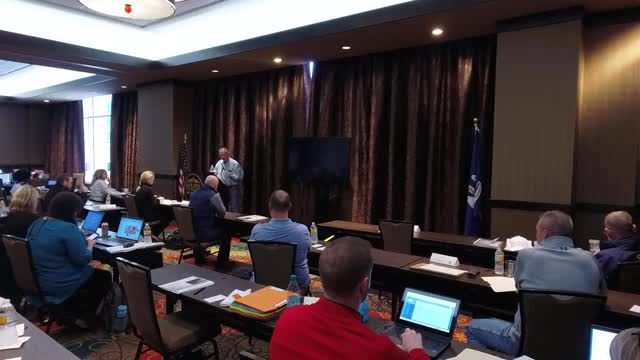Policy refresher urges clearer separation of policy and procedures, warns on public-records and executive-session risks
Get AI-powered insights, summaries, and transcripts
Subscribe
Summary
Curtis "Bob" Hammons, a presenter leading the board policy refresher, told Lafayette Parish School Board members at a workshop that most draft policies arrive from a private consulting firm and are reviewed thoroughly by staff before they reach the board.
Curtis "Bob" Hammons, a presenter leading the board policy refresher, told Lafayette Parish School Board members at a workshop that most draft policies arrive from a private consulting firm and are reviewed thoroughly by staff before they reach the board. He outlined the internal review steps, statutory checks and implementation tasks the board should expect before and after adopting policies.
Hammons said the process typically begins with Forethought Consulting drafting a proposed policy, which goes to the district risk manager and other staff for legal and operational review. "I write a letter to the superintendent saying, I've looked at this pretty carefully. I think it is consistent with law and policy," Hammons said. He added that staff and legal review may remove or reword provisions before a final draft reaches the board.
The training stressed why that pre‑approval review matters. Hammons noted that the legislature passed hundreds of acts in a recent session — he cited "792 acts of the legislature" — and said staff must check each draft against statutes, state regulations and effective dates. He reminded members that the district fiscal year begins July 1 and that, by state law, the budget must be submitted by Sept. 15.
Hammons highlighted a recent statutory conflict involving the district's sick‑leave bank. He said a legislative change now allows an individual to donate "up to 50% of his accumulated sick leave directly to another person," which can conflict with local sick‑leave bank rules that limit donations or withdrawals. "If she can't use a 100 days, then what's the purpose for the donation?" he asked, describing staff work to reconcile the statute with existing district procedures.
On the form of policy documents, Hammons urged the board to keep policy statements and administrative procedures separate. He said a concise policy should state intent and goals while a separate procedures manual should allow the superintendent and staff to make operational changes without returning to the board. "If you tweak one tiny piece of the procedures after they have been approved by the board as policy, then you gotta go back to the board," he said, arguing that separation reduces unnecessary agenda items.
Hammons also reviewed governance rules in the district policy manual: agenda preparation (assigned to the superintendent under policy BBVA), committee structure and voting thresholds (a simple majority of members present and voting for most motions, but some actions such as selecting a superintendent require a majority of the board's total membership), and the district's approach to reconsideration under Robert's Rules of Order.
He explained the board's reconsideration options: a motion to reconsider under Robert's Rules must be made at the same meeting, but the district's policy allows an item to be returned on subsequent agendas within the same calendar year. "If it fails again, now we're into a new calendar year... you can put it back on the agenda in January," Hammons said, describing how the parish rule differs from strict parliamentary limits.
The training addressed public participation and public‑meeting risks. Hammons cited a district policy provision that, in his interpretation, cuts off additional public comment after the board begins deliberation on an agenda item: "Once the school board has begun its deliberation on an agenda item, there shall be no further public comment on that item," he read. He warned that repeatedly returning to the audience after each substitute motion is not required by policy even if the board chooses to do so.
Hammons warned about public‑records exposure when board members transact official business on personal devices. "If you're transacting in business... via cell phone or via texting, or emails, then there's a possibility you're gonna get a request from those," he said, noting recent litigation elsewhere and advising caution when using personal phones for board business.
He reviewed executive‑session grounds and minute‑keeping requirements, telling members that the board should record which statutory ground justifies an executive session and record how each member voted to enter it. "I prefer that you say which one you're going in under, because it needs to be reflected in the minutes," Hammons said, adding that only litigation requires case naming on the public agenda.
Hammons closed by reminding members that after the board adopts policies the district must train staff and principals on changes. Superintendent Francis Tusche, who opened the session with brief remarks praising the communications team and chief‑of‑schools staff, told members that the administration follows up each board meeting with staff meetings to communicate new policy or agenda items to principals and school administrators.
No formal motions or board votes were recorded in the transcript of the workshop portion of the meeting; the session was presented as informational and procedural guidance.
Next steps described during the training included staff finalizing drafts consistent with statute and B E S E rules, providing Hammons' review letter to the superintendent, and district staff scheduling principal and administrator training after board approval of any policy changes.
